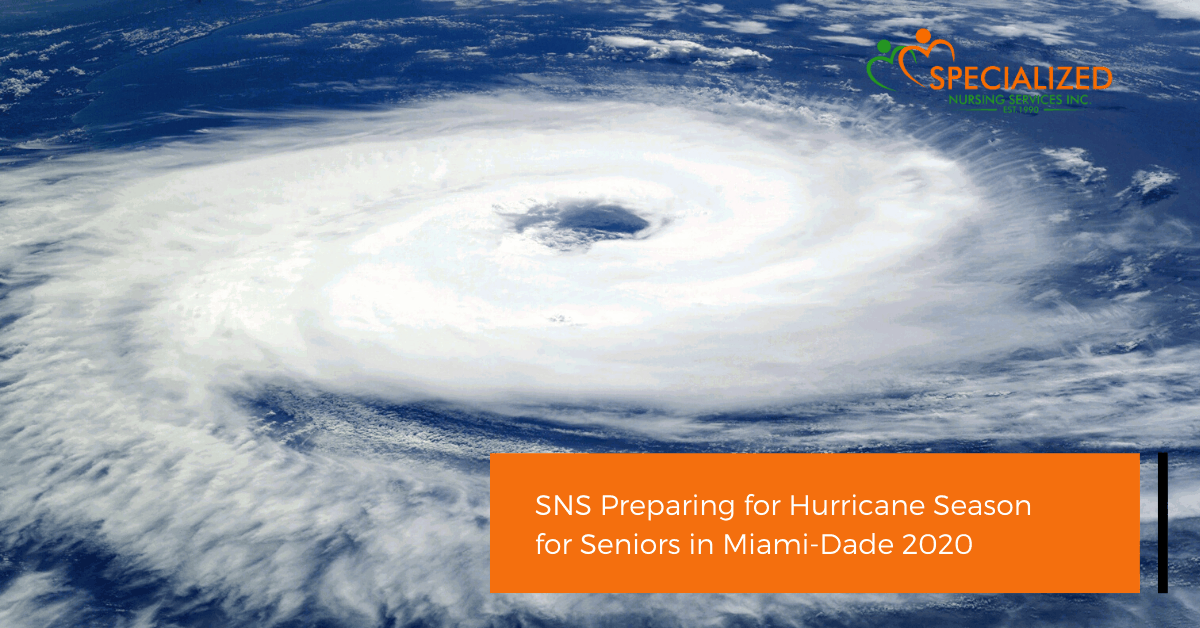Hurricane season in Florida runs from June 1- November 30, 2020.
Hurricanes are high-intensity tropical storms. They can create large scale disasters for entire cities and communities. Those living in South Florida, especially near the coasts, can be at risk. Often there are devastating impacts for those who are not prepared.
Certain populations, including older adults, or adults with special medical needs ought to be prepared in advance of hurricanes in case of various aftermath situations. If your parent or loved one typically receives in-home care, it is a good idea to have a plan in place.
You should make arrangements for your senior or homebound parent before, during, and after the storms. This means advanced planning so that when there is an impending storm, no one is scrambling at the last minute.
Before the Storm:
Hurricane readiness means being prepared for the worst.
Look up local evacuation maps and evacuation assistance programs. Ensure that your loved one is in a secure home. If there are any issues that can be simply fixed, do so before the threat of a hurricane.
Look at windows, doors, and roofs. Shutters can be a relatively simple fix to secure doors and windows.
If your parent’s home is not a secure shelter that can withstand hurricane forces, identify a nearby shelter facility. Many cities and counties offer medical evacuation shelters and services for those seniors in need. Typically, caregivers or nurses can accompany patients with medical concerns.
These arrangements should be considered before hurricanes so that seniors (or their caregivers) know how they will be transported to shelters, and which shelters are appropriate. Check this link through Miami-Dade County to look for hurricane medical shelters in the south Florida area.
All Miami-Dade County hurricane evacuation shelters exceed Americans with Disabilities Act (ADA) standards for emergency shelters and include accessible entryways, service, and activity areas and bathrooms. Service animals are permitted in all Miami-Dade County hurricane evacuation shelters.
If your loved one relies on electricity or power to operate medical gear and equipment it is even more important to plan in advance and identify an appropriate medical shelter facility. It is also incredibly important to gather enough medication or other medical materials your parents may need, in advance.
During the Storm:
If a senior remains in the home (with or without an in-home caregiver) ensure they have enough supplies to last a few days. Frequently check radio or television news reports for weather updates and public safety instructions.
It is best to stay in a room with no windows or doors for safety. It can be a good idea to turn off the main electrical breakers to protect the electrical infrastructure.
If the home begins to incur damage, take steps to move towards your previously identified emergency plan. If your city offers emergency transportation services, you may be able to arrange a ride to a shelter for a senior or medically disabled person. Check here for emergency evacuation services through Miami-Dade county.
If storms become emergency situations, the local authorities will activate emergency operations centers, and medical shelters will open. Hurricane evacuation centers will have additional resources to better serve and accommodate disabled evacuees, including Special Needs Enhanced Beds (SNEB), text telephones (TTY), picture boards and large print material. Similarly, some hurricane evacuation centers for seniors may be able to assist in ambulation, feeding or dressing and assistance recharging of wheelchair batteries, etc.
The final important note during the storm is to stay inside. Flooding and electrical damage can occur creating hazards for anyone walking in streets- especially those who may already have trouble walking. Stay inside during the storm!
After the Storm:
Seniors who are still in their home, and the home is intact and still has electricity can remain home. Local authorities will begin cleaning roadways and removing debris. If there is no emergency, patients should stay in their homes.
If seniors are in disaster centers or medical shelters, they may typically stay for a short duration post-storm, but will likely be relocated to long-term emergency shelters, or if possible, return home.
South Florida Hurricane Season 2020
The most important way to avoid an emergency situation during the hurricane season is to be prepared. Make a checklist for before, during, and after the storm. Plan in advance where your elderly or sick parent will go in the event of a hurricane. Think through the logistics now, and alleviate your worry later.
Call Specialized Nursing Services of Miami to learn more about hurricane preparedness for your senior parent during the 2020 Hurricane season.


